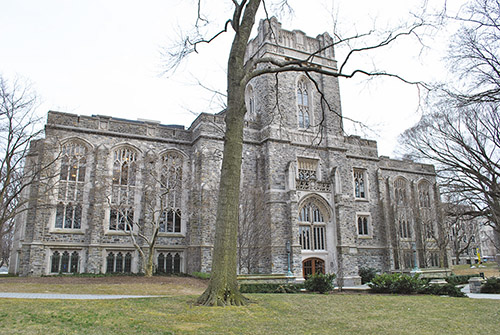
Fordham University won its long legal battle to deny Students for Justice in Palestine (SJP) club recognition when New York’s highest court affirmed an appellate division decision in favor of the university.
The May 4 refusal by the New York State Court of Appeals to hear the case effectively ends a long battle that began in 2015 when an application to form the club was filed. The following year, the university denied the request citing SJP’s “political goals” and “polarizing” nature.
The court decision upheld the university’s procedures and standards for granting club recognition.
“Fordham University is pleased that the court validated the university’s administrative processes regarding the formation of student clubs,” said Bob Howe, university assistant vice president for communications and special adviser to the president, in a statement to The Jewish Link. “Fordham is committed to serving all of its students, both in and out of the classroom. The university did not and does not believe that a chapter of SJP is in the best interests of its students.”
He said another club, Advocates for a Palestinian Perspective, was formally approved in December. Its purpose will be to educate students about the Israeli-Palestinian conflict, the human rights of Palestinians and to promote actions toward peace.
Roz Rothstein, co-founder and CEO of StandWithUs, in a statement to The Jewish Link, congratulated Fordham on its “final, decisive victory.” StandWithUs, an international pro-Israel campus advocacy and education organization, had an amicus brief filed with on the court on its behalf by attorney Aaron Eitan Meyer of Hauppauge, New York, in support of Fordham.
“Students for Justice in Palestine has a long record of creating hostile climates for Jewish students and others,” Rothstein said. “As such, this case may very well serve as a precedent for other private universities that do not want to enable hate groups to organize on their campus. Administrations should use all legal means at their disposal to protect Jewish students against the hate, extremism and bigotry that SJP promotes.”
The university’s Dean of Students Keith Eldredge issued his 2016 rejection after consultation with students, faculty, staff and conducting his own research and deliberation, deciding SJP’s goals “would be inconsistent with university goals.
“While students are encouraged to promote diverse political points of view, and we encourage conversation and debate on all topics, I cannot support an organization whose sole purpose is advocating political goals of a specific group, and against a specific country, when these goals clearly conflict with and run contrary to the mission and values of the University,” he said.
SJP and its advocacy of the Boycott Divestment Sanctions (BDS) movement against Israel has been a lightning rod for controversy on many college campuses. The BDS movement is considered antisemitic by the State Department and has been overwhelmingly condemned by Congress.
Four students initiated legal action in 2017 against Fordham, an independent Jesuit-affiliated institution with campuses in the Bronx, Manhattan and Westchester County, with representation by cooperating counsel Alan Levine, Palestine Legal and the Center for Constitutional Rights (CCR). With only one of the original four still a student two years later, another student joined the legal proceedings.
On its website, CCR said one of the causes it advocates for is Palestinian rights and has often partnered with Palestine Legal to document efforts to silence advocates for Palestinian human rights and provide them with legal support and advocacy.
CCR also has long challenged “impunity for the Israeli government’s violations of international law related to its illegal occupation of Palestine, U.S. support that enables Israel’s violations, and efforts to punish activists for speaking out in solidarity with Palestine.”
In a press release issued June 9, CCR criticized the appellate division’s “hastily issued” reversal after “minimal analysis.” It also termed Fordham’s initial refusal “irrational and inconsistent with its own policies, which protect free expression.
“No further appeals are possible in this case, which was brought under a state law that only applies in New York,” stated the release. “The appellate court narrowly found that the case could not be pursued by Fordham students that had since graduated, or by current students despite being subject to the same ban, since they had not reapplied to start SJP. The court also deferred to Fordham’s decision-making discretion, without delving into the specific facts of the case. This case did not include a First Amendment challenge because Fordham is a private university, and it does not affect students’ rights to organize on other campuses.”
In 2019 Judge Nancy Bannon of the First Judicial District Supreme Court issued a ruling in favor of SJP, which was appealed by the university.
In December, the appellate division ruled not only did the original court not have standing in the case but also added, “We would have concluded the petition should not have been granted.”
The court backed up the university’s procedures for its denial and its conclusion that the campus chapter would have been affiliated with a national organization “reported to have engaged in disruptive and coercive actions on other campuses, would work against, rather than enhance [the university’s] commitment [to] open dialogue and mutual learning and understanding, was not ‘without sound basis in reason’ or ‘taken without regard to the facts.’”
The amicus brief can be viewed at https://www.standwithus.com/
By Debra Rubin










